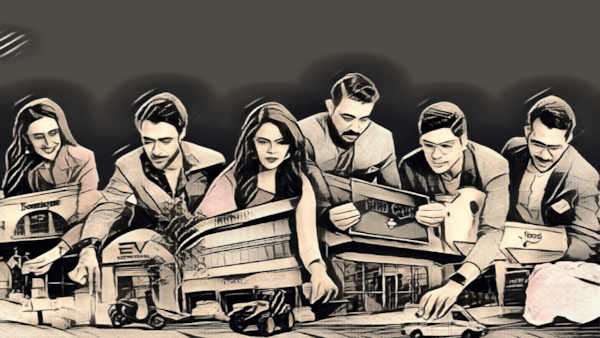Newsletter: In Shark Tank India S2, Reality Bytes
Shark Tank India's Season 2 treads a well-worn path for desi talent/reality show programming, writes Manik Sharma.

Last Updated: 01.45 PM, Jan 25, 2023
This column was originally published as part of our newsletter Stream Of Consciousness on January 23, 2023. Subscribe here. (We're awesome about not spamming your inbox!)
***
THERE IS A SEQUENCE in Shark Tank India Season 2 that quietly emphasises the natural path most reality television programming in India is expected to take. Things might start feisty or even frivolously for different formats, but subsequently there is now an identifiable common ground where tropes coalesce. A middle-aged man (founder of a sneakers brand) with a business on the brink of collapse walked into the Tank, where his pitch turned into a demonstration of human fragility rather than a last-ditch leap at survival. You can consume the sight of his emotional vulnerability, until the aftermath, when the fog of sympathy begins to lift. To a show that evaluates businesses, does it make sense to platform something that is nearing its end or is — in the show’s own words — “un-investible”? In business terms, obviously no; but in terms of ‘eye-balls’, a loud yes.
Shark Tank India’s original season teased a belated bifurcation of the reality TV phenomenon. There was finally something that looked and sounded intellectual, and sought to mine drama from the science of numbers and ideas. To a large extent, it even succeeded. But then came moments like Jugaadu Kamlesh and a bizarre pitch around women’s navels (again, who let this one through?) that returned the promise of a fresh new frontier to the shores of the tried-and-painfully-established. Even Shark Tank India has evidently, in the process of becoming popular, gladly fallen victim to the idea that that popularity must at all cost be extended. The starting point for this trend goes back to a red herring roughly two decades ago, in the short history of talent reality TV shows in India. Well after the lithe, undramatic days of Doordarshan’s Meri Awaaz Suno, even post the somewhat explosive launch of MTV’s Roadies, there was Indian Idol, a show that possibly changed the Indian audience’s relationship with reality (or at least the perception of its televised version).
The first season of Indian Idol is obviously remembered for the kind of response and fandom it generated, but it was also key in setting a unique precedent. Ravinder Ravi, a daily wage worker at the time, came out of nowhere and ripped apart the playbook. More than his talent, it was Ravi’s lack of privilege that became the focus. Indian Idol might not have discovered its eventual winner in Ravi, but reality TV in general, had found its core ideal. In a country rife with crippling inequality, the version of reality everyone wanted to consume, evidently, was one where heroism was possible without structural reckonings — i.e. ‘Give me a hero but don’t ask me to become one’.
Ravi’s lack of privilege, his rags-to-fame story captured the country’s imagination and reality television spiralled into a creative rut it has since reproduced with ghastly devotion. Today, you can switch between any number of reality/talent shows and there’d probably be half a dozen stories about the underprivileged, twisting themselves senseless to gather your attention. The problem isn’t that these stories are highlighted, as cynical as that might seem, but how they are now packaged as a mandate.
Of course India’s inequality lends itself to a variety of infraction points that reality, or at least this colourful reconstruction of it, is supposed to exhibit. But rather than act as equalisers, stages where talent and skill precedes background and privilege, there now seems to be an insistence to first unload emotional baggage that renders the actual unleashing of talent secondary. In fact, you have to wonder if that is what reality Tv’s core product is: emotional manipulation. Amitabh Bachchan’s Kaun Banega Crorepati has to some extent strayed away from these devices but that probably has to do with a format that itself qualifies a kind of privilege (literacy and therefore a certain caste-class cadre). The rest of them, pretty much all of them, either aggregate celebrities for second-hand wattage or invisibilise the country’s caste anxieties in exchange for class inequalities that sits better with an upper-caste audience. The rest are probably just happy to be a part of it.
Shark Tank India hasn’t quite devolved into the Freudian farce that most dance and singing competitions on GECs (general entertainment channels) represent, but it has in this second season become uncandid, imitating predecessors it threatened to rebuke. For a show that strictly prioritises things like unit economics, market value and numbers, the sight of bizarre ideas and throwaway non-deals is a sign of the many ways that this new, braver landscape is starting to fizzle into old ideas; packaging grief, or the lack of privilege, as a viewing reward.
It’s obvious why caste is never mentioned on national TV but class so often is. Because it sweeps everything under one convenient blanket of grit and determination. We don’t obviously care for any of these people, because on the radar of reality TV, they are just one of the many blips. One of hundreds of ‘awe-inspiring’ stories that are now the product, with reality or a rather convenient version of it, as by-product. Ravinder Ravi eventually became a contestant everyone — including that season’s judges — hoped would leave Indian Idol because his social capital had begun to overshadow genuine talent. He was eventually voted out but the fallout of that generational discovery has continued to educate and shape the version of reality we’d like to eat our dinners to. For breakfast we’d maybe — just maybe — eat the truth.

 Premium
Premium